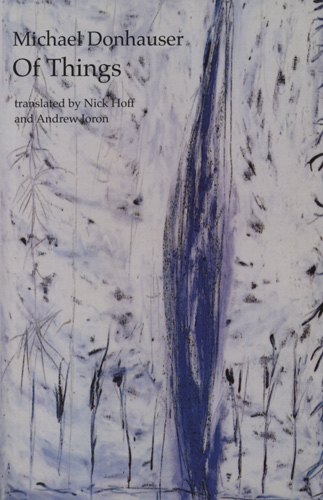Of Things
Michael Donhauser is an accomplished Austrian poet, essayist, and critic whose books date back nearly thirty years, but he is not widely known to English readers. It makes him a great candidate for Dichten—Burning Deck’s translation series, which brings this rich and varied collection, Of Things (first published in German nearly twenty years ago), to a needed new audience. It’s a dizzyingly varied work, finely translated by Nick Hoff and Andrew Joron. It is philosophically poised but historically informed, personal, scientific, whimsical, and serious—showcasing a real rucksack of literary tools that Donhauser brings into the field with him to sketch, like the plein air painter, his subjects. Michael Donhauser is an accomplished Austrian poet, essayist, and critic whose books date back nearly thirty years, but he is not widely known to English readers. It makes him a great candidate for Dichten—Burning Deck’s translation series, which brings this rich and varied collection, Of Things (first published in German nearly twenty years ago), to a needed new audience. It’s a dizzyingly varied work, finely translated by Nick Hoff and Andrew Joron. It is philosophically poised but historically informed, personal, scientific, whimsical, and serious—showcasing a real rucksack of literary tools that Donhauser brings into the field with him to sketch, like the plein air painter, his subjects.
These subjects are, as you’d imagine from the title, things, and more accurately natural things: “The Thicket,” “The Manure Pile,” “The Fruit Tress,” “The Marsh Marigold,” “The Meadow Chervil,” “The Peach,” “The Gravel,” “The Larch Forest,” “The Tomato,” and “The Cypress.” Each poem is relatively long, about ten pages, and are separated by seasonal sections, though somewhat unusually hybridized/transitional seasons: “Winter: Spring,” “Spring: Summer,” “Summer: Fall”—and ending there (you could or could not make something of his decision to leave off “Fall: Winter”).
This relatively straightforward structure supports Donhauser’s frank and matter-of-fact approach—there is no real irony to these poems, no trickery, no games. Instead they rely on a linguistic precision and, above all else, an astonishing endurance for visual attention. These poems positively stare at their subjects, not letting up until just about everything is sussed out. Here he is, right at the opening, in “The Thicket:”
Whereas it’s almost solid.
Almost earth; its topmost layer under conifers.
In the state right before compose: near decay.
Still firm, structure, thought, factual.
Lines.
Thus more accessible as a drawing, but dense.
But not pastel.
(Not painted or pastose.)
Marked by a tangled line.
Tangled lines.
So dense that no bird can find refuge there.
Insofar lifeless: a lifeless insofar.
Donhauser’s style is marked by a number of intersecting continental traditions, and I am tempted to highlight, especially, phenomenology—an acute attention to perception as a cognitive event, perception as a cherished empirical object. If I can’t go that far, I will say that his intense perceptive focus quickly destabilizes his scenes, and this is where the real beauty of his poetry lies—his objects open up, and we are flooded with reminiscences, philosophical musings, quotes from other writers, etymologies, and all sorts of additional intellectual fodder. Sometimes we are with Donhauser in direct ways as a curious scholar, such as this unguarded moment from “The Peach”:
(I went into my room to look up, in order to be sure, that the peach, like the cherry, is a stone fruit. I hesitated, unsure if it would be in the zoology or botany book: absent, lost in language, present. So present with the peach that it came to life: animated through language, through the animality of language, its quivering).
Sometimes we are with him in startling moments of existential awareness, such as this sudden thought of death in “The Manure Pile”:
A step on the way from Bovel to Jenins.
(Past the manure piles in Rofels.)
As if I would come finally to the more essential.
Meaning: closer to the moment.
That rings out: it is finished.
Sometimes we are with him in Proustian moments of remembrance (Donhauser is also a noted translator of French authors, especially Rimbaud and Francis Ponge), such as this auditory flashback in “The Gravel”:
(If I still hear gravel, then I hear the gravel from the terrace in front of my grandmother’s house in Eschen: the terrace was a small, almost square area of gravel, bordered on the north- and southeast by the walls of the house and thus protected from the wind. . . . On Monday during Whitsuntide, my mother, grandmother, and aunts sat on the terrace in the afternoon sun, at the cornerstone of the house wall: the men played cards in the parlor above. Only my grandfather sat next to the women on a folding chair, his forehead shadowed by his hat brim.)
The best moments, I believe, are when he keeps his subject clearer in sight as a kind of magnetic center for an associational and self-reflexive mania, such as these early lines from “The Marsh Marigold”:
To write about it: as a yellow heart.
Where the landscape is now without a heart: manifold.
Touched by the yellow of the gas-station signs, the plastic bands.
Of the ground markings, the wood frames, the first meadow flowers.
(As if I took the path over the meadows.)
The yellow of cowslips, of the buttercups, of the dandelions.
And thus yellow as starting point and its wearers in the genitive.
In language: in the genitive quality of things.
Provided that it doesn’t do the naming straightaway.
Provided that it also takes a detour: remembering.
What’s particularly thrilling about the way Donhauser executes all these different approaches is that he does so with varying degrees of penetration and visual completeness: at times we see him fully sketched, smoking a cigarette while leaning against a wall on the boardwalk, and at others we have a sense only of the quality of light in a place. These poems are, in this way, deeply experimental, but earnestly so, clinging to few conceits, flaring few clever maneuvers, and making no territorial gestures. They are messy poems, to be sure, and any reader of them ought to expect a little loss of traction here and there. But the collection is a treasure trove of acute moments of imagistic precision and philosophical poignancy, and they are delivered with a refreshingly uncomplicated but nonetheless rigorous effort.





